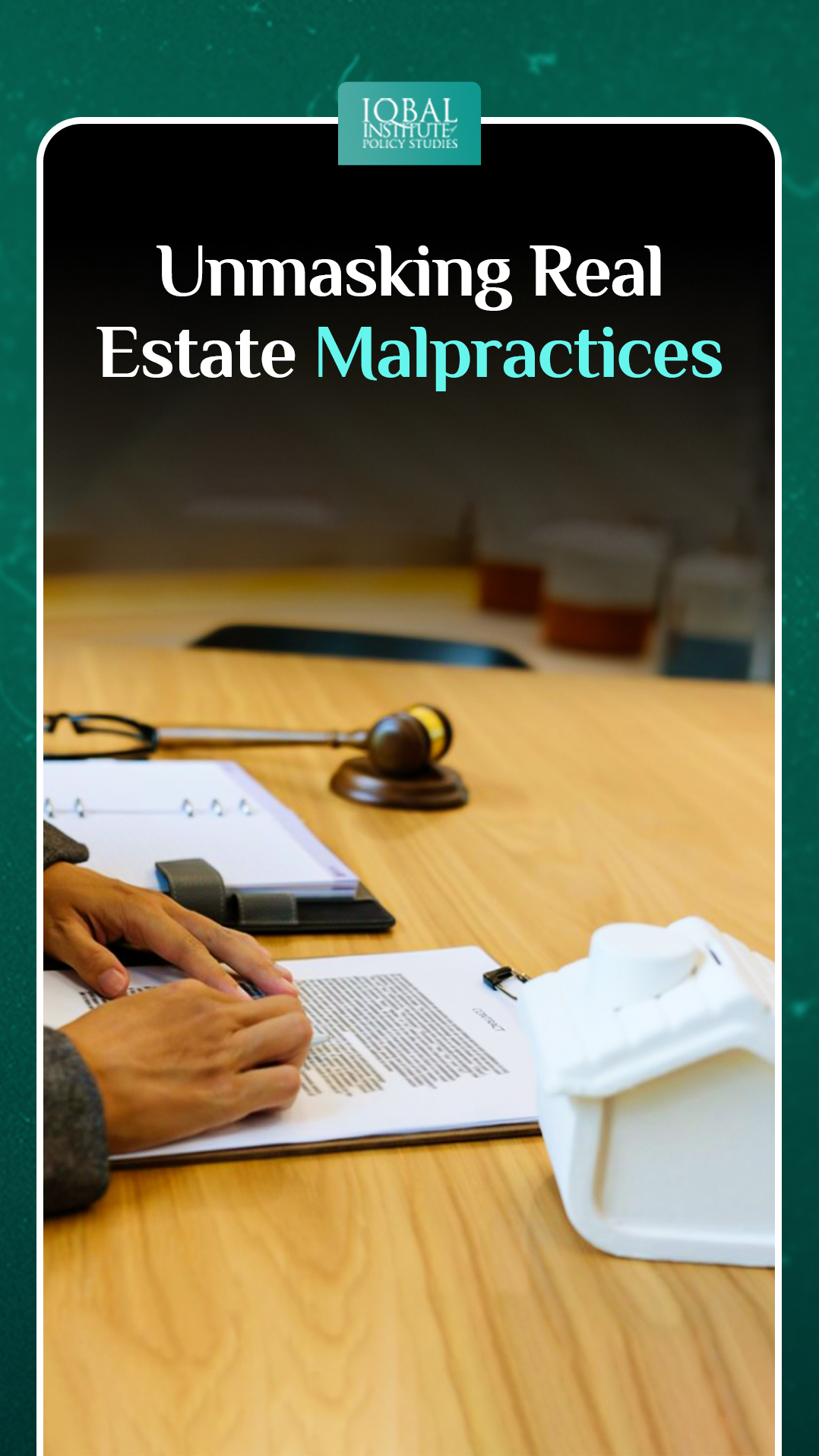Real estate malpractices create problems in an industry crucial to personal and economic well-being. The real estate, often touted as a sound investment, can sometimes be a breeding ground for malpractices and scams. While many real estate agents demonstrate professionalism by adhering to legal and ethical standards, regrettably, not all maintain the same level of diligence. Any negligence or errors on the part of a real estate agent can result in significant financial losses and time delays for both buyers and sellers. In certain instances, clients, or even clients represented by another agent in the same transaction, may have grounds to file a lawsuit for professional malpractice, potentially jeopardizing the agent’s license. Thus, as a prospective buyer or seller, it is crucial to navigate the market with a discerning eye and an awareness of potential red flags. Understanding real estate malpractices empowers secure decision-making. Whether buying, selling, or working in the industry, promoting honesty and ethical behavior fosters a trustworthy real estate environment. This ensures that the path to homeownership and investments is built on integrity and dependability.
What are the Malpractices?
Following are some of the real estate malpractices to look out for.
Unusual Requests for Payment
In real estate sector, money is a powerful motivator, and scammers are quick to exploit this. One common red flag is an unusual request for payment. Legitimate transactions typically follow established procedures, and deviations from these norms should raise suspicion. Be wary of sellers who insist on unconventional payment methods or rush investors into making quick financial decisions. Furthermore, to avoid falling victim to wire fraud, always verify payment details directly with your real estate agent or legal representative. Scammers often use misleading information to divert funds, leaving unsuspecting buyers or sellers in financial jeopardy.
Pressure Tactics
The pressure to make quick decisions in real estate transactions can be overwhelming, but it is essential to resist high-pressure sales tactics. Reputable agents understand the significance of a well-considered decision and would not push investors into hasty choices. Thus, take your time to thoroughly research and understand the terms of the transaction. If something feels rushed or too good to be true, it is worth taking a step back. Moreover, recognizing these red flags early can save one from potential financial loss and stress down the line.
Real Estate Ponzi Schemes
Real Estate Ponzi Schemes are deceptive investment plans where people are promised big returns on real estate investments. However, the profits for early investors are paid using money from new investors. This cycle continues until the scheme collapses, resulting in significant losses for those who invested later. These schemes highlight the importance of careful research and skepticism in investment decisions,being cautious of deals that appear overly lucrative.
Misleading Information in Listings
Property flipping, the art of buying low and selling high, has gained popularity in real estate. However, not all flippers operate ethically. Some resort to deceptive practices, starting with misleading information in property listings. Also, unscrupulous sellers may exaggerate the condition of a property or its potential for renovation, enticing buyers with promises that do not align with reality. Therefore, conduct thorough research beyond the information provided in listings. Seek independent assessments of the property’s condition and potential renovation costs. Do not solely rely on the seller’s representation, as their primary goal may be a quick sale rather than the investor’s long-term satisfaction.
Unethical Renovation Practices
Beyond misleading listings, unethical flippers may engage in deceptive renovation practices. This could involve cutting corners, using substandard materials, or failing to disclose known issues. Buyers who are unaware of these practices may find themselves facing unexpected expenses and frustrations after the purchase. Vigilance is key. Before committing to a property, conduct a detailed inspection or hire a professional to ensure that renovations meet acceptable standards. Insist on transparency from the seller regarding any past or ongoing renovations, and be wary of deals that seem too good to be true.
Mortgage Fraud: Deceptive Lending Practices
Mortgage fraud is a serious concern in real estate transactions, impacting both lenders and borrowers. It encompasses a range of deceptive practices, such as providing false information on mortgage applications, inflating property values, and engaging in fraudulent activities during the loan approval process. Homebuyers can protect themselves by understanding common types of mortgage fraud. If a deal seems overly complicated or if one is pressured to provide inaccurate information, these could be signs of fraudulent activity. Always work with reputable lenders, and ensure that all financial information provided is accurate and verifiable. Also,, keep detailed records of all communication and transactions, including emails, contracts, and financial documents. Verify the legitimacy of all involved parties, and consult legal or financial professionals if you have any doubts.
Dual Agency Dangers
Dual agency occurs when a real estate agent represents both the buyer and the seller in a transaction. While this may seem convenient, it introduces significant risks, primarily related to conflicts of interest. A dual agent is obligated to serve the best interests of both parties, but the potential for bias exists, raising concerns about fair representation. Understanding the risks associated with dual agency is crucial. Buyers and sellers may find themselves in a situation where confidential information is inadvertently shared, negotiations are compromised, and conflicts arise. In some cases, the dual agent may prioritize closing the deal over ensuring each party’s satisfaction. To mitigate the dangers of dual agency, consider seeking independent representation. Buyers and sellers can each have their dedicated real estate agents, ensuring that their interests are solely represented. While dual agency is legal in some jurisdictions, being aware of its potential pitfalls allows individuals to make informed decisions about their representation in real estate transactions. Furthermore, encourage open communication with your real estate agent. If you have reservations about dual agency, discuss them openly and explore alternative arrangements. In many cases, agents are willing to work within the framework that ensures transparency and prioritizes their clients’ interests.
Title Fraud
Title fraud occurs when someone fraudulently transfers the ownership of a property to themselves or a third party. This is often done without the knowledge of the true property owner, leading to severe financial and legal consequences. Fraudsters may use various methods, including forged signatures and false documents, to manipulate property titles. Protecting against title fraud involves regular monitoring of property titles. Property owners should check their titles periodically to ensure that no unauthorized changes have occurred. Additionally, consider investing in title insurance, which can provide financial protection in the event of title fraud.
Kickbacks and Secret Commissions
Kickbacks and secret commissions are forms of unethical behavior within the real estate industry, where agents or brokers receive undisclosed payments for steering clients toward particular services or deals. Such practices compromise the agent’s fiduciary duty to act in the best interests of their clients. Kickbacks can take various forms, including referral fees, gifts, or other financial incentives. Understanding the dynamics of kickbacks and secret commissions is essential for both buyers and sellers. Transparency is crucial in any real estate transaction, and undisclosed financial arrangements can lead to conflicts of interest, potentially resulting in suboptimal outcomes for the client.
Technology’s Role in Real Estate Scams
Advancements in technology have revolutionized the real estate industry, providing convenience but also introducing new avenues for fraud. Online scams, including phishing schemes and fake property listings, are prevalent. Buyers and sellers should exercise caution when sharing personal information online and verify the legitimacy of online listings before engaging in any transactions. Moreover, protecting personal information during online transactions is crucial. Use secure, reputable platforms, and be wary of sharing sensitive details via email or unsecured websites. Consider employing encryption tools and staying informed about the latest cybersecurity measures to minimize the risk of falling victim to online scams.
Legal Recourse for Real Estate Fraud Victims
Real estate fraud victims have legal avenues to pursue justice and restitution. Understanding your rights is crucial in the aftermath of fraudulent activities. Consult with legal professionals to explore potential courses of action based on the specific circumstances of the fraud. This may include civil litigation, reporting the incident to law enforcement, or seeking assistance from real estate regulatory bodies.
If you suspect real estate malpractices, reporting the incident to the appropriate authorities is a crucial step. Local real estate boards, regulatory agencies, and law enforcement bodies may have established procedures for filing complaints. Be prepared to provide detailed documentation, including contracts, communications, and any evidence of fraudulent activities. Furthermore, legal recourse often involves seeking restitution for financial losses incurred due to real estate malpractices. This may include pursuing a civil lawsuit against the responsible parties, such as fraudulent sellers, agents, or brokers. Consult with legal professionals specializing in real estate law to assess the viability of legal action and determine the best strategy for recovering losses.
Conclusion
In the complex landscape of real estate transactions, awareness and vigilance are your strongest allies. By staying vigilant and informed, you can protect yourself from falling prey to real estate malpractices and contribute to a more transparent and ethical real estate industry. An empowered and educated consumer is the first line of defense against fraud in real estate.
This article is written by Haneen Gul. Haneen is a research analyst at the Iqbal Institute of Policy Studies (IIPS).



Leave a Reply